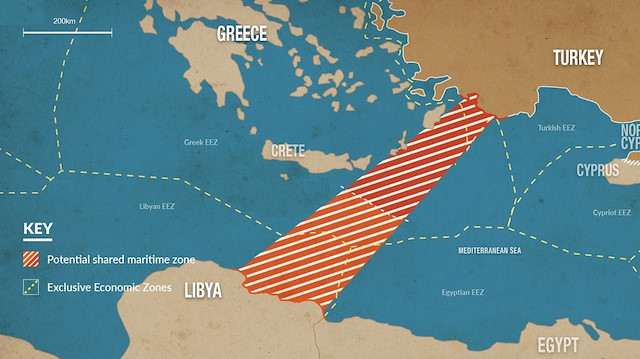
The three ministers agreed on continued coordination in the future in order to 'shut Turkey out of the region.'
The foreign ministers of Egypt, Greece and Southern Cyprus have reached a scandalous agreement that aims to “consolidate efforts” to counter Turkey’s plans in the Eastern Mediterranean following Ankara’s historic maritime agreement with Tripoli.
The three ministers agreed on continued coordination in the future in order to “shut Turkey out of the region.”
Meanwhile, Greek Cypriot administration leader Nikos Anastasiadis telephoned Egypt’s putschist leader Abdel Fattah al-Sisi on Friday, according to reports.
During the phone call, Sisi and Anastasiadis discussed Turkey’s steps in the Eastern Mediterranean as well as the agreement signed between Ankara and Tripoli.
According to a statement made by Greek Cypriot government spokesman Kyriacos Koushos, the Egyptian president said that beyond condemning the agreement, no “positive result” was attained, noting that they agreed with Anastasiadis that “necessary measures to block similar agreements must be taken.”
Sisi stated that Turkey’s military’s presence in Libya “could lead to instability in the region,” the spokesman was quoted as saying.
On Nov. 27, Ankara and Tripoli reached two separate memorandums of understanding (MoU), one on military cooperation and the other on maritime boundaries of countries in the Eastern Mediterranean.
Following the military cooperation deal, Turkish President Recep Tayyip Erdogan said Ankara might consider sending troops to Libya if the Tripoli government made such a request.
In April, Haftar's forces launched a military campaign to capture Tripoli, but has so far failed to progress beyond the city's outskirts. However, on Dec. 12, Haftar announced he had ordered his militants to launch a "decisive battle" to capture the city.
According to UN data, more than 1,000 people have been killed since the start of the operation and more than 5,000 injured.
Since the ouster of late leader Muammar Gaddafi in 2011, two seats of power have emerged in Libya: one in eastern Libya supported mainly by Egypt and the United Arab Emirates, and another in Tripoli, which enjoys UN and international recognition.


